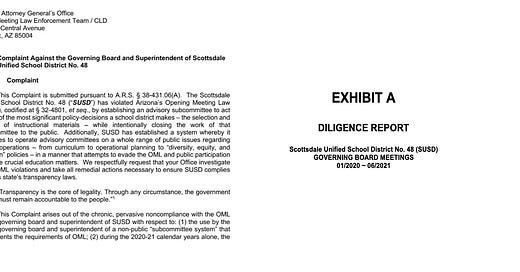The Open Meeting Law - Curricula Adoption Primer Series
Porting and consolidating the Twitter OML Primer Series into Substack
In this post:
The Twitter OML Primer Series
Parts I and II: Introducing the Legal Process: OML and Curricula Adoption
Legislative History: How a Soft-spoken Rancher from Southeast Arizona Changed the Landscape for all Arizona Schools
The Case of Litchfield Elementary School District - the AG Comes Down
My Testimony to the AZ Senate Education Committee on…
Keep reading with a 7-day free trial
Subscribe to ||Longer Thoughts|| to keep reading this post and get 7 days of free access to the full post archives.




